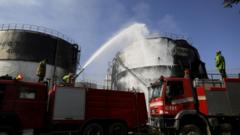Following an Israeli airstrike in Beirut that resulted in significant casualties, Hezbollah launched over 60 projectiles into Israel, marking an alarming increase in hostilities between the two factions. This exchange comes as both sides engage in complex negotiations regarding a potential cease-fire, amid rising military operations and regional tensions.
Hezbollah Intensifies Rocket Attacks on Israel Following Deadly Airstrike in Beirut

Hezbollah Intensifies Rocket Attacks on Israel Following Deadly Airstrike in Beirut
Escalating violence marks a critical moment in the Israel-Hezbollah conflict after a deadly strike in Beirut prompts retaliatory actions.
Hezbollah fired more than 60 rockets into Israel on Sunday, just a day after an Israeli operation in Beirut killed at least 20 individuals, including civilians. Three Israeli defense officials indicated that the operation aimed to eliminate a prominent Hezbollah military leader, Mohammad Haidar, although reports confirm he survived the attack.
As air raid sirens echoed through northern Israel, Israeli military officials confirmed that some projectiles were intercepted by defense systems. A noted injury occurred in northern Israel when a woman was treated for shrapnel wounds. Hezbollah confirmed it targeted Israeli soldiers located within Lebanese territory, illustrating the growing scope of the conflict.
In response to ongoing threats, Israel intensified military operations aimed at weakening Hezbollah's infrastructure in Lebanon. The Israeli military has conducted strikes on locations deemed to support militant activities and has advised the evacuation of residents from five southern Lebanese villages.
Reflecting on the broader situation, diplomatic sources indicate that discussions for a cease-fire between Israel and Hezbollah are ongoing but remain precarious. Regional and U.S. officials expressed cautious optimism for a potential agreement, although they acknowledged that unresolved disputes could disrupt the negotiation process.
Both Israel and Hezbollah continue to vow commitment to their military positions as they navigate the complex web of negotiation and conflict escalation.
As air raid sirens echoed through northern Israel, Israeli military officials confirmed that some projectiles were intercepted by defense systems. A noted injury occurred in northern Israel when a woman was treated for shrapnel wounds. Hezbollah confirmed it targeted Israeli soldiers located within Lebanese territory, illustrating the growing scope of the conflict.
In response to ongoing threats, Israel intensified military operations aimed at weakening Hezbollah's infrastructure in Lebanon. The Israeli military has conducted strikes on locations deemed to support militant activities and has advised the evacuation of residents from five southern Lebanese villages.
Reflecting on the broader situation, diplomatic sources indicate that discussions for a cease-fire between Israel and Hezbollah are ongoing but remain precarious. Regional and U.S. officials expressed cautious optimism for a potential agreement, although they acknowledged that unresolved disputes could disrupt the negotiation process.
Both Israel and Hezbollah continue to vow commitment to their military positions as they navigate the complex web of negotiation and conflict escalation.


















